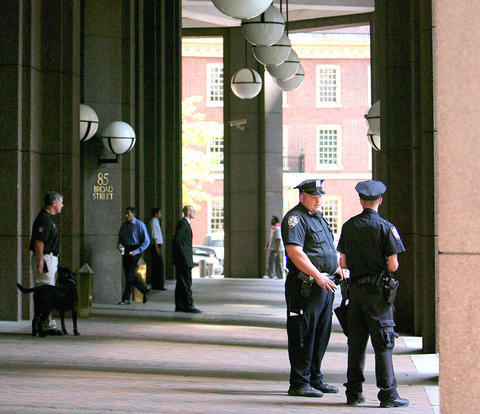The FBI is investigating anonymous mailed threats against the investment banking house Goldman Sachs, but does not consider the warnings to be of "high credibility," an investigator said on Friday.
The letters, handwritten in red ink on loose-leaf paper and signed "A.Q.U.S.A.," were mailed to 20 newspapers around the US, authorities said.
The letters contained the warning: "Hundreds will die. We are inside. You cannot stop us."

PHOTO: EPA
A federal law enforcement official familiar with the investigation said that the FBI "does not assign high credibility to the threat" because of the circumstances surrounding the letters, including their brevity and the nonspecific nature of the threat. The investigator spoke on condition of anonymity.
Michael DuVally, a Goldman Sachs spokesman, said the firm was working closely with law enforcement authorities, adding that authorities told the firm they didn't believe the threat was credible.
"We take any threat to the safety to our people seriously," DuVally said. "We have a broad range of security measures in place to counter all likely threats and we're monitoring the situation closely."
New York FBI spokesman James Margolin said the bureau was trying to determine the origin of the letters.
"All threats are taken seriously," he said.
The letters, postmarked late last month from the New York boroughs of Queens and the Bronx, were being analyzed by FBI and US Postal inspectors at the FBI crime lab in Washington and at the postal service lab in Dulles, Virginia, said Tom Boyle, a spokesman for the Postal Inspection Service.
Another investigator familiar with the case said it might be difficult to isolate the fingerprints of whoever sent the letters because others touched the envelopes after they were mailed. The investigator said the letters are believed to have been dropped in mailboxes and not mailed from a post office.
Investigators said they also will be looking for DNA evidence that may have been contained in saliva left when the envelopes were sealed. In addition, they will be examining the postal bar codes routinely stamped on letters to pinpoint exactly where the letters entered the mail stream.
The letters were mailed to newspapers in Seattle; Boise, Idaho; Corpus Christi, Texas; Fort Wayne, Indiana; Bayonne and Newark, New Jersey; and cities in Vermont, Ohio and North Dakota.
The newspapers notified local law enforcement agencies after receiving the letters and in some cases alerted Goldman Sachs directly, law enforcement officials said. Officials said they had no reason to suspect that the newspapers that received the letters have been targeted.
Jim Chapman, assistant metro editor of the Journal Gazette in Fort Wayne, said his paper received one of the letters postmarked Queens on July 2 and immediately turned it over to the FBI.
Goldman Sachs did not receive any of the threatening letters, Boyle said.
Goldman Sachs is based in New York and has offices in London, Frankfurt, Tokyo, Hong Kong and other cities. About 3,000 people work in its 44-story Jersey City, New Jersey, tower.
It is a federal crime to send threats through the US mail, punishable by up to 10 years in prison if convicted.

The US dollar was trading at NT$29.7 at 10am today on the Taipei Foreign Exchange, as the New Taiwan dollar gained NT$1.364 from the previous close last week. The NT dollar continued to rise today, after surging 3.07 percent on Friday. After opening at NT$30.91, the NT dollar gained more than NT$1 in just 15 minutes, briefly passing the NT$30 mark. Before the US Department of the Treasury's semi-annual currency report came out, expectations that the NT dollar would keep rising were already building. The NT dollar on Friday closed at NT$31.064, up by NT$0.953 — a 3.07 percent single-day gain. Today,

‘SHORT TERM’: The local currency would likely remain strong in the near term, driven by anticipated US trade pressure, capital inflows and expectations of a US Fed rate cut The US dollar is expected to fall below NT$30 in the near term, as traders anticipate increased pressure from Washington for Taiwan to allow the New Taiwan dollar to appreciate, Cathay United Bank (國泰世華銀行) chief economist Lin Chi-chao (林啟超) said. Following a sharp drop in the greenback against the NT dollar on Friday, Lin told the Central News Agency that the local currency is likely to remain strong in the short term, driven in part by market psychology surrounding anticipated US policy pressure. On Friday, the US dollar fell NT$0.953, or 3.07 percent, closing at NT$31.064 — its lowest level since Jan.

Hong Kong authorities ramped up sales of the local dollar as the greenback’s slide threatened the foreign-exchange peg. The Hong Kong Monetary Authority (HKMA) sold a record HK$60.5 billion (US$7.8 billion) of the city’s currency, according to an alert sent on its Bloomberg page yesterday in Asia, after it tested the upper end of its trading band. That added to the HK$56.1 billion of sales versus the greenback since Friday. The rapid intervention signals efforts from the city’s authorities to limit the local currency’s moves within its HK$7.75 to HK$7.85 per US dollar trading band. Heavy sales of the local dollar by

The Financial Supervisory Commission (FSC) yesterday met with some of the nation’s largest insurance companies as a skyrocketing New Taiwan dollar piles pressure on their hundreds of billions of dollars in US bond investments. The commission has asked some life insurance firms, among the biggest Asian holders of US debt, to discuss how the rapidly strengthening NT dollar has impacted their operations, people familiar with the matter said. The meeting took place as the NT dollar jumped as much as 5 percent yesterday, its biggest intraday gain in more than three decades. The local currency surged as exporters rushed to